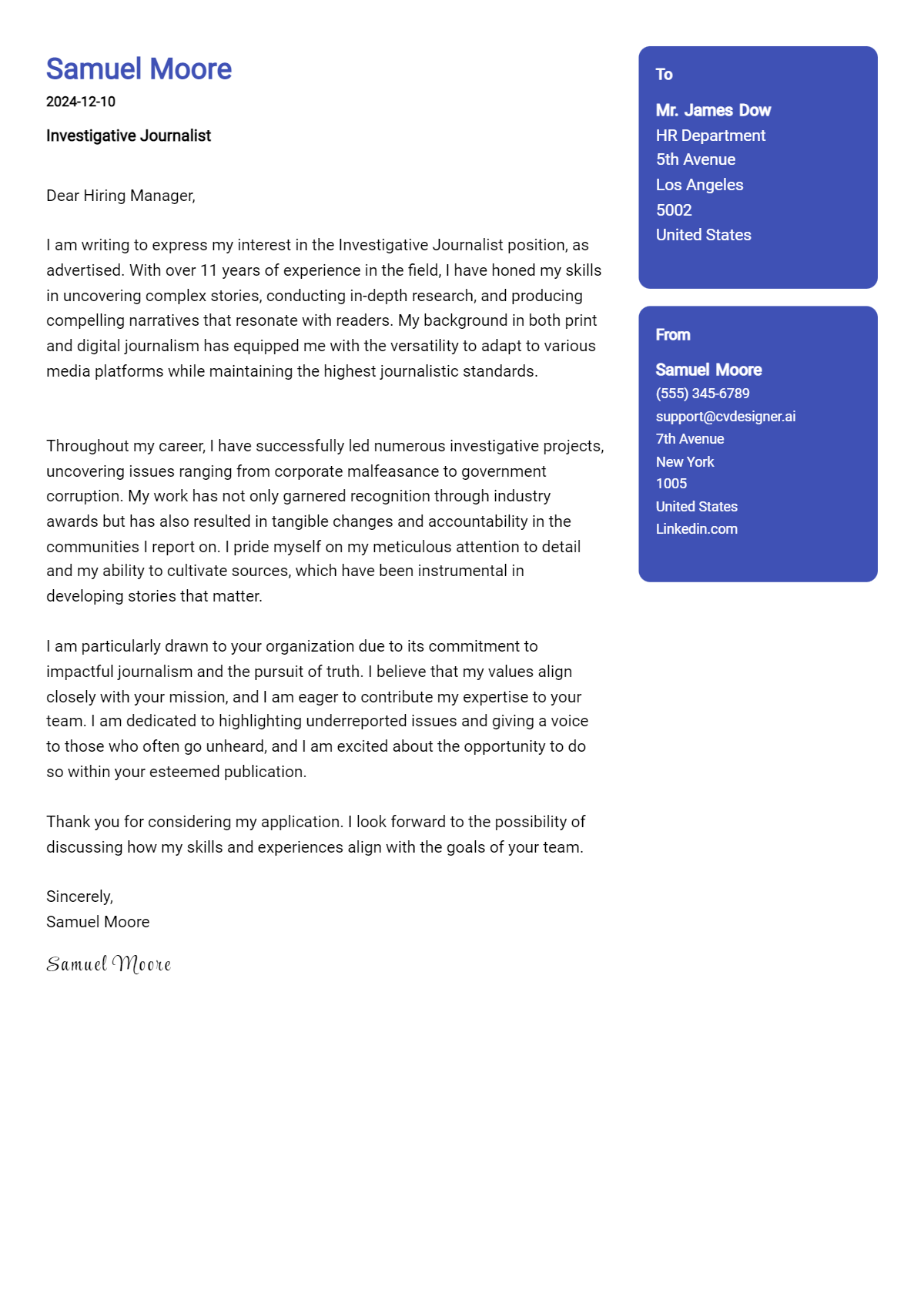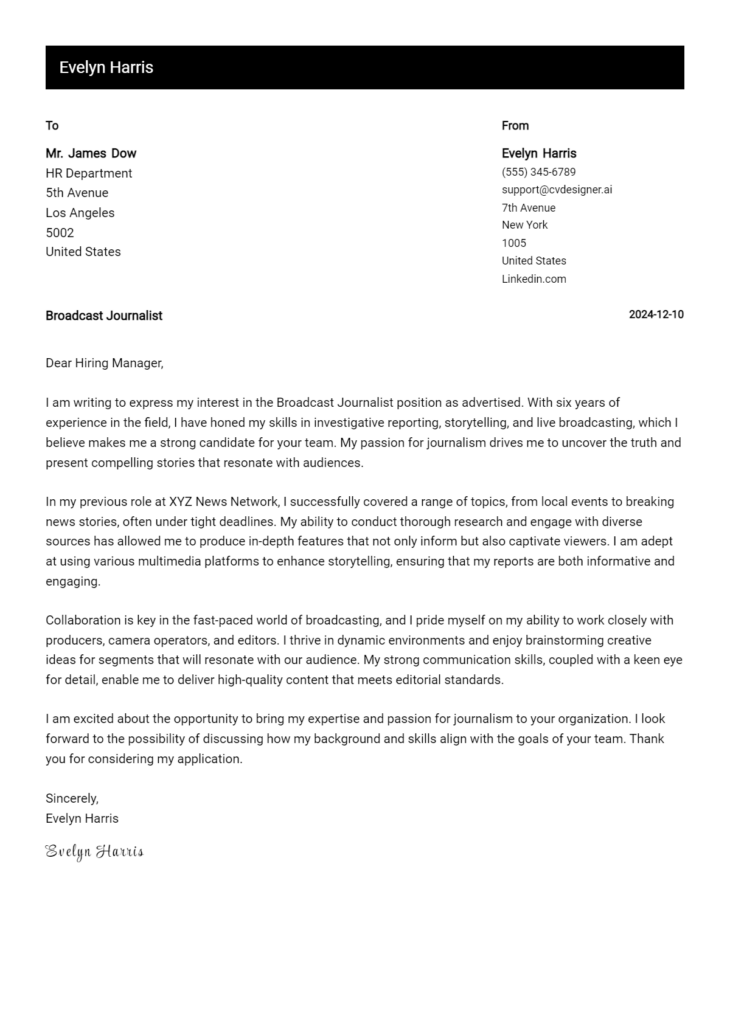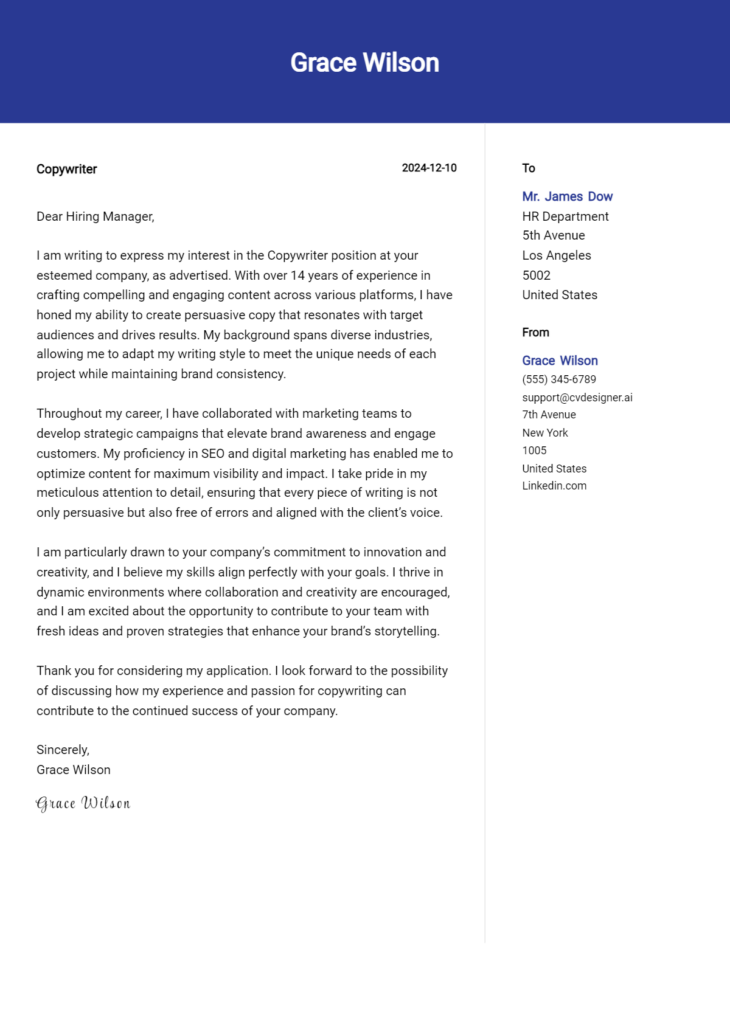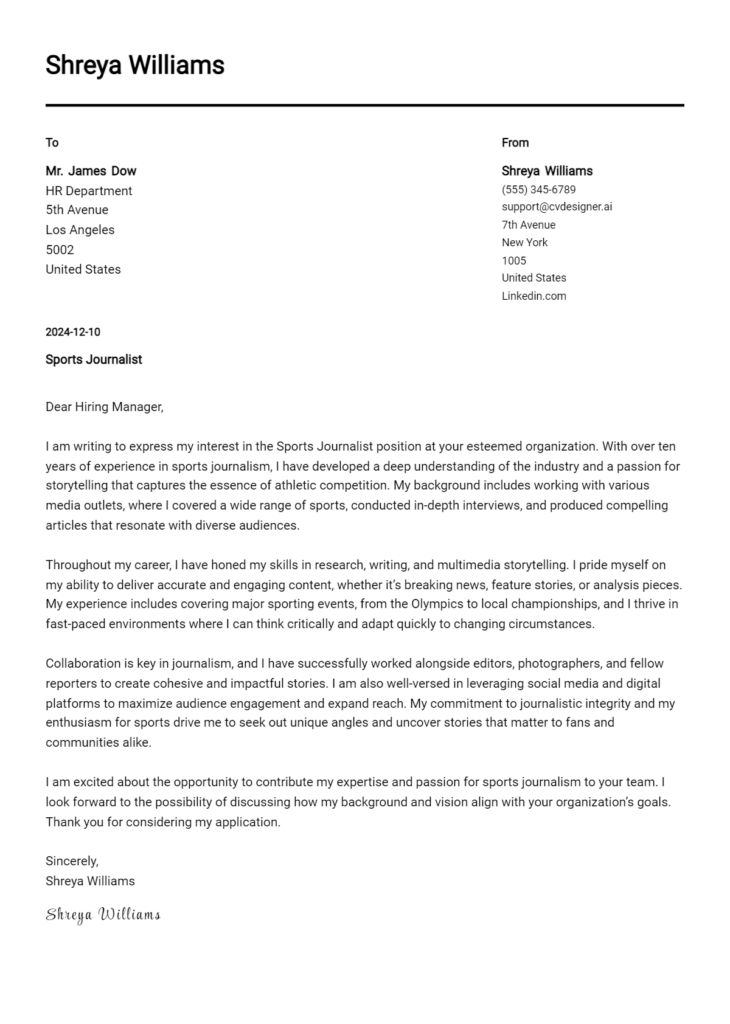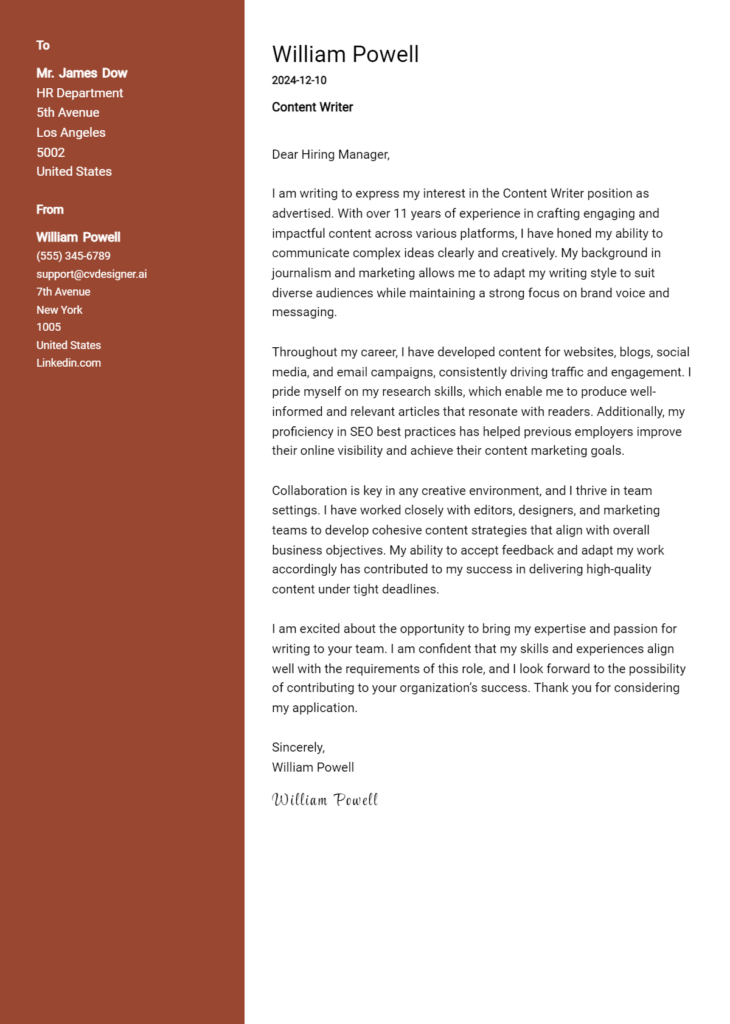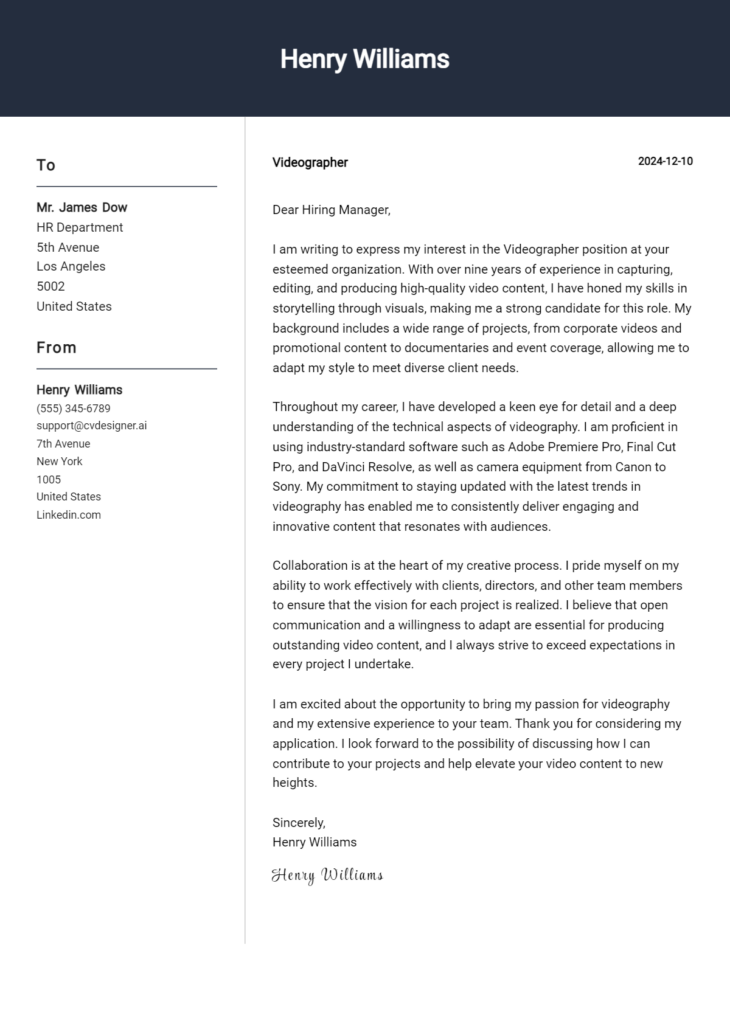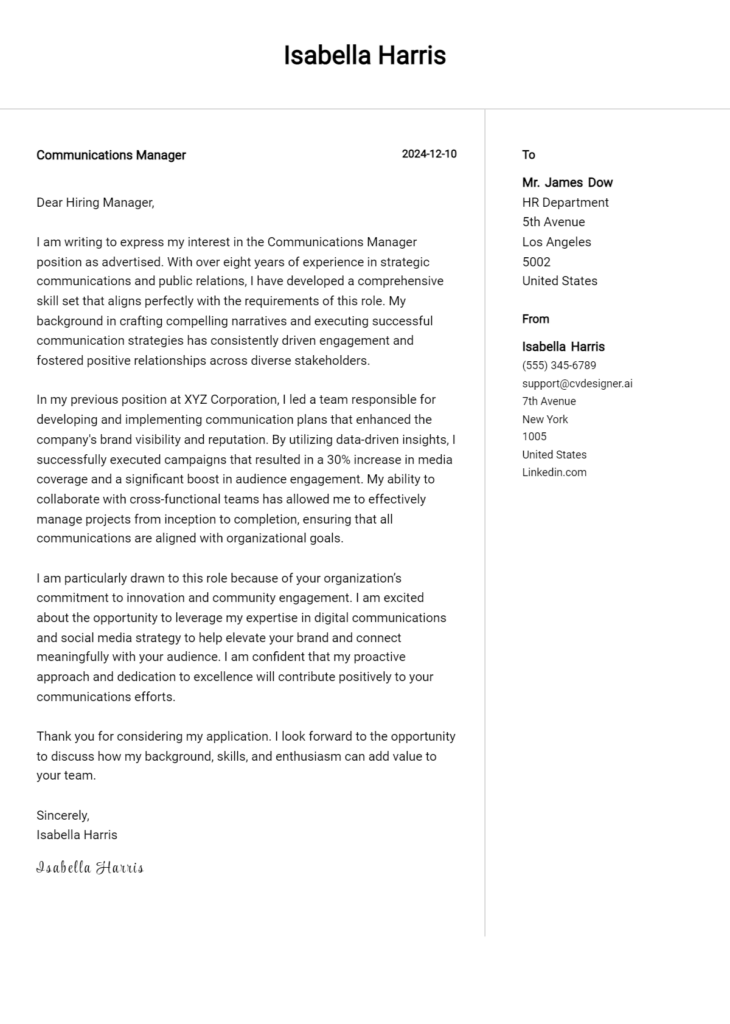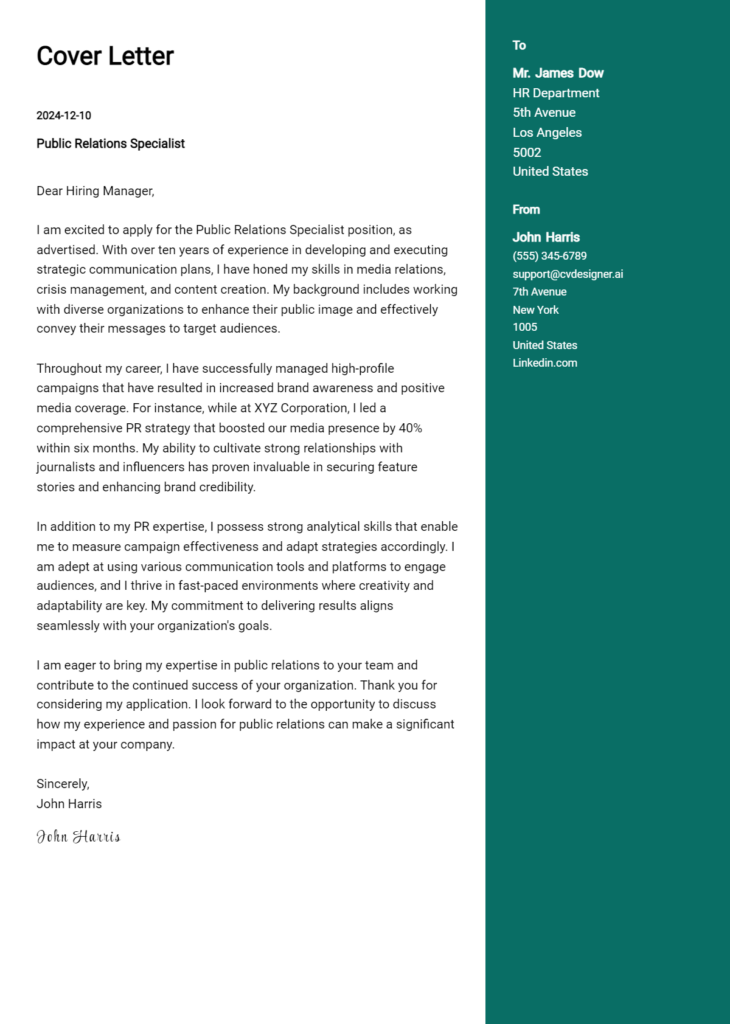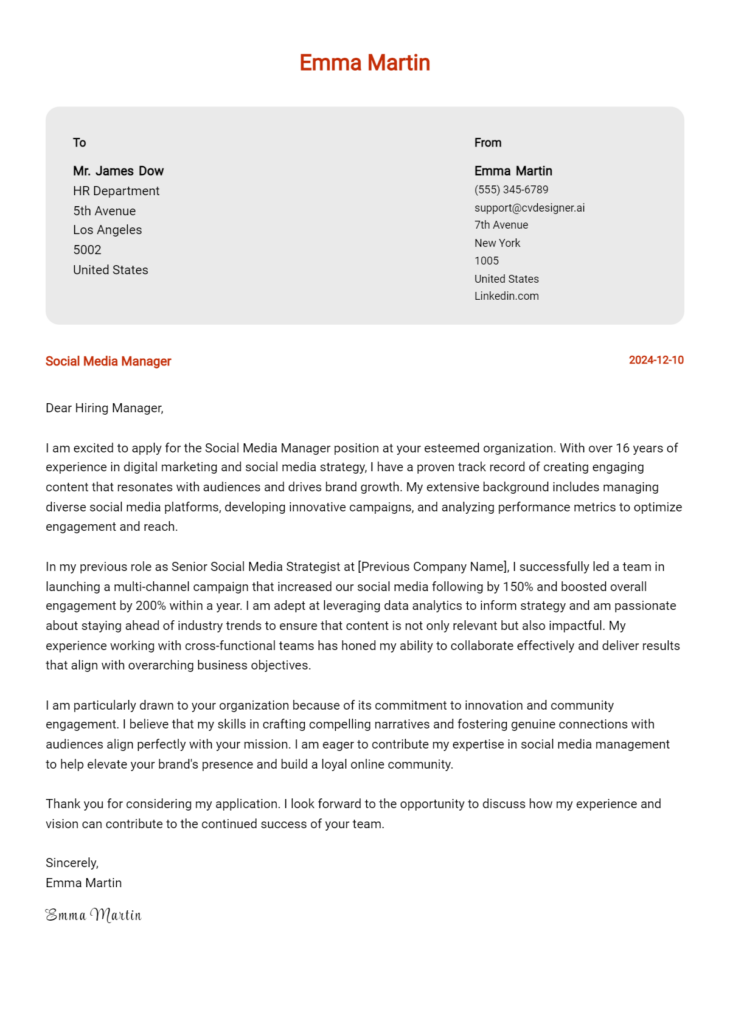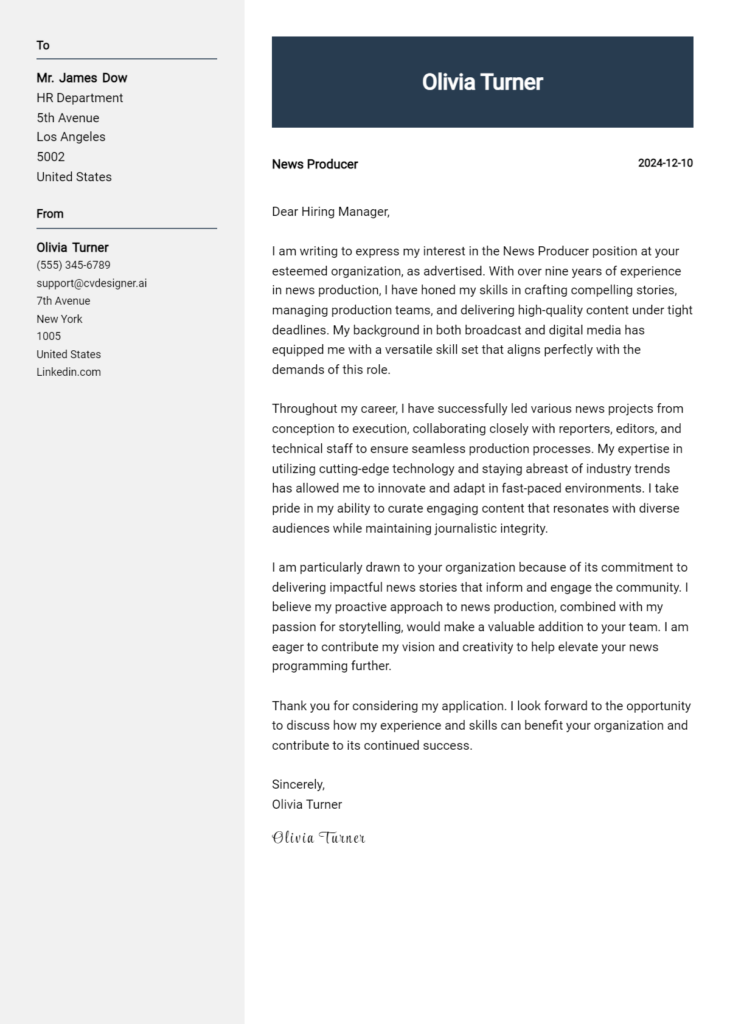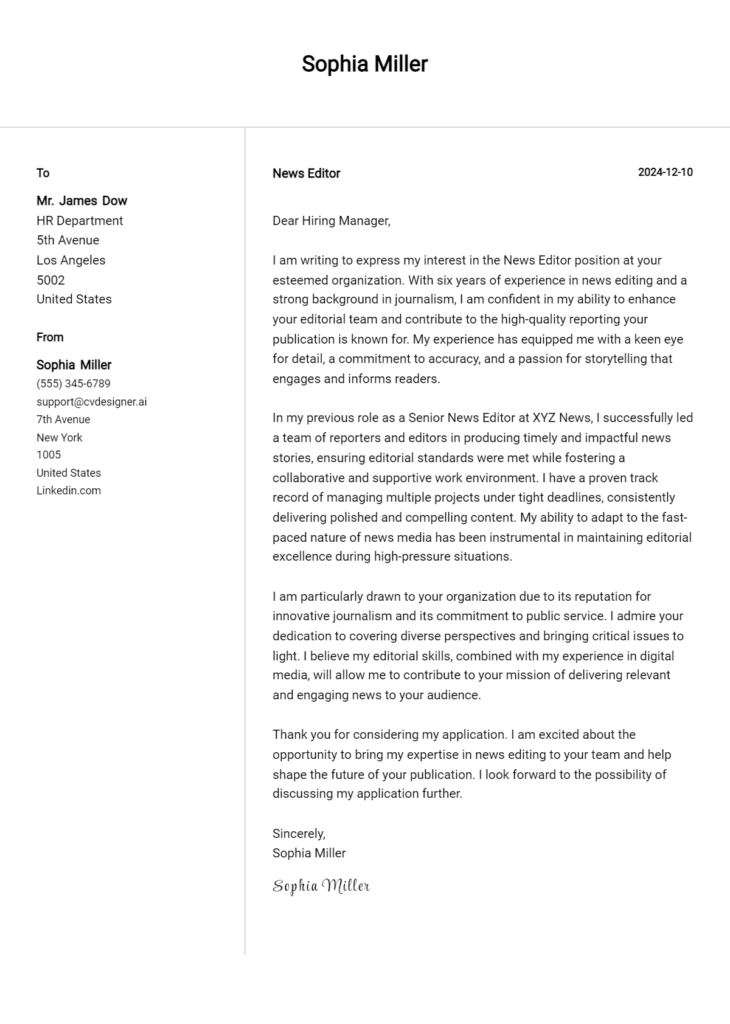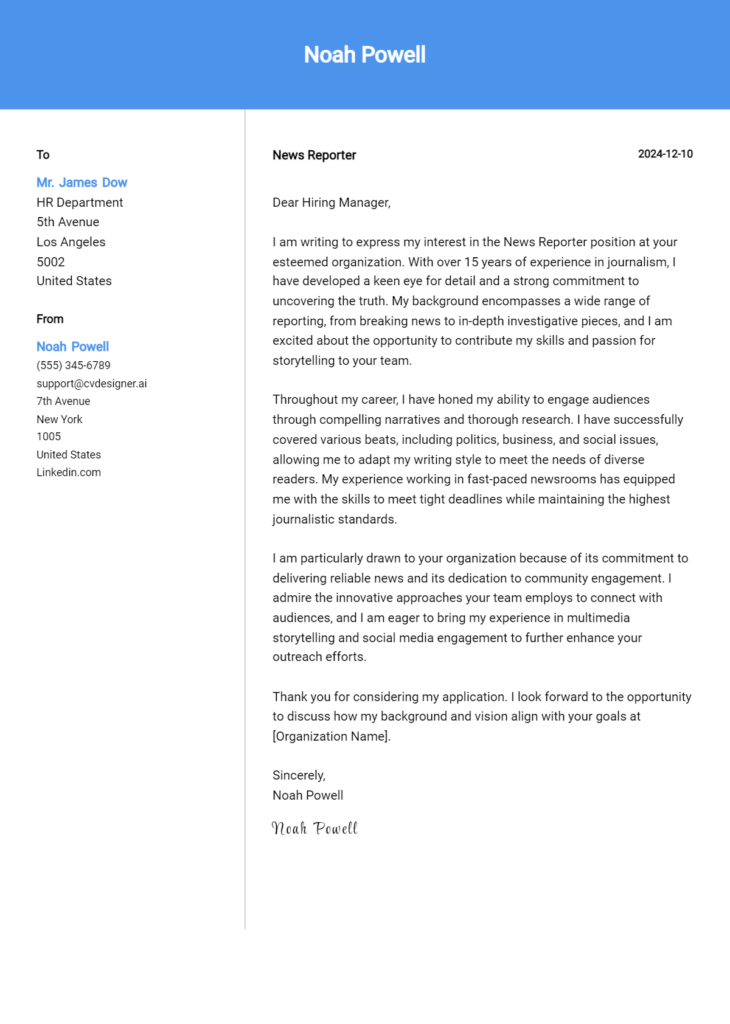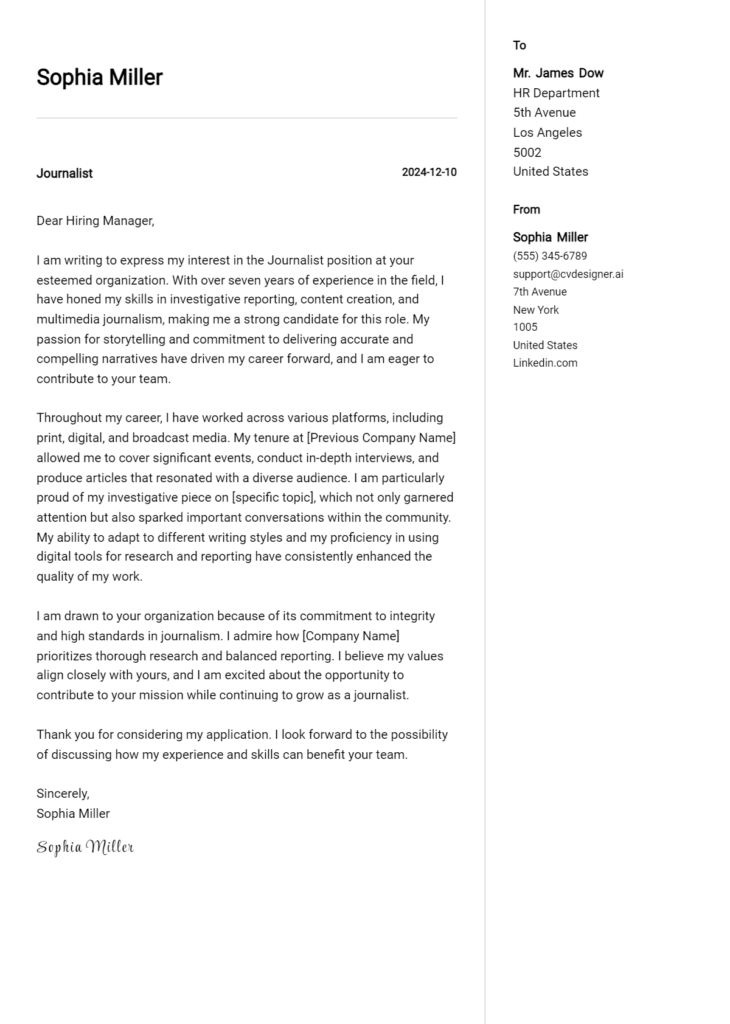Investigative Journalist Cover Letter Examples
Explore additional Investigative Journalist cover letter samples and guides and see what works for your level of experience or role.
How to Format an Investigative Journalist Cover Letter?
Crafting a compelling cover letter is crucial for an investigative journalist, as it serves as a vital first impression that showcases your storytelling ability and attention to detail. The way you format your cover letter not only reflects your professionalism but also highlights your skills in research and communication—essential attributes in the field of investigative journalism. A well-structured cover letter can captivate hiring managers, drawing them into your narrative and demonstrating your unique approach to uncovering the truth.
In this guide, we'll explore how to effectively structure your cover letter, providing insights and journalist-specific examples to help you create a persuasive document.
We'll focus on the essential components of a professional cover letter, including:
- Cover Letter Header
- Cover Letter Greeting
- Cover Letter Introduction
- Cover Letter Body
- Cover Letter Closing
Each section is crucial in emphasizing your qualifications and journalistic integrity. Let’s break down each part and discuss how to make your investigative journalist cover letter truly stand out.
The Importance of a Cover Letter Header for an Investigative Journalist
A well-crafted cover letter header is crucial for an investigative journalist as it serves as the first impression for potential employers. It provides essential contact information and sets the tone for professionalism and clarity throughout the application. A strong header includes your name, address, phone number, email, the date, and the recipient’s details (such as their name, title, and organization). This structured format not only conveys professionalism but also ensures that your application is easily identifiable and accessible.
Strong Example
Jane Doe 123 Investigative Lane Journalism City, NY 10001 (555) 123-4567 jane.doe@email.com October 15, 2023 Mr. John Smith Editor-in-Chief The Truth Daily 456 News Ave Media Town, NY 10002
Weak Example
jane doe email: jane.doe@email.com 555-123-4567 15/10/2023 to: editor
In the strong example, all necessary details are clearly presented and formatted correctly, showcasing professionalism. In contrast, the weak example lacks structure and clarity, which could lead to confusion and a negative impression.
The Importance of the Cover Letter Greeting
The greeting of your cover letter is your first opportunity to make a positive impression on the hiring manager, setting the tone for the rest of your application. A well-crafted greeting demonstrates professionalism and shows that you have taken the time to personalize your letter, which can be particularly important in the field of investigative journalism, where attention to detail is critical. Avoiding generic greetings, such as "To Whom It May Concern," can help you stand out. Instead, take the initiative to research the recipient's name—this small effort can convey your enthusiasm for the position and the organization.
Here are some examples to guide you:
Strong Greeting Example
Dear Ms. Johnson,
Weak Greeting Example
To Whom It May Concern,
By addressing the hiring manager directly, you not only establish a personal connection but also demonstrate your commitment to the application process, which is especially valued in investigative journalism.
The Importance of a Compelling Cover Letter Introduction for an Investigative Journalist
A well-crafted cover letter introduction is crucial for an investigative journalist seeking to capture the attention of a hiring manager. This opening paragraph serves as a first impression, setting the tone for the rest of the letter. It should not only express the candidate’s genuine interest in the role but also showcase their most relevant skills or notable achievements in a concise manner. A strong introduction can differentiate a candidate from others, while a weak one may lead to missed opportunities. Below are examples of both strong and weak cover letter introductions for an investigative journalist position.
Strong Example
Dear [Hiring Manager's Name], As an investigative journalist with over seven years of experience uncovering stories that matter, I am excited to apply for the position at [Company Name]. My recent exposé on local government corruption not only garnered national attention but also led to significant policy changes, demonstrating my commitment to holding power accountable. I believe my skills in research, data analysis, and storytelling align perfectly with your team’s mission to deliver impactful journalism.
Weak Example
To Whom It May Concern, I am writing to apply for the investigative journalist position. I have worked in journalism for a few years and think I could do a good job. I have covered different topics and have some experience with interviews.
Purpose of the Cover Letter Body for an Investigative Journalist
The body of a cover letter for an Investigative Journalist serves as a platform for the candidate to articulate their unique skills, relevant experiences, and the value they bring to the organization. It allows journalists to highlight specific projects or accomplishments that demonstrate their ability to uncover the truth, conduct thorough research, and engage readers effectively. By detailing past investigative work, the candidate can showcase their storytelling prowess, analytical skills, and commitment to journalistic integrity, making a compelling case for their fit within the company.
Strong Example
In my previous role at The City Times, I spearheaded an investigative project that uncovered a significant corruption scandal involving local government officials. This project not only led to multiple resignations but also earned the newspaper a prestigious award for investigative journalism. My research involved analyzing thousands of public records and conducting interviews with key whistleblowers, which honed my ability to navigate complex data and maintain ethical standards. I am eager to bring my passion for uncovering the truth and my commitment to holding power accountable to your team at The Investigative Journal.
Weak Example
I have done some reporting in the past and I think I would be a good fit for this role. I once wrote an article about a local event that was interesting. I believe I can find stories and write articles. I hope to work for your newspaper because I like what you do.
Importance of Cover Letter Closing for an Investigative Journalist
The closing paragraph of a cover letter is crucial for leaving a lasting impression on potential employers. For an investigative journalist, it should effectively summarize your qualifications, express your enthusiasm for the role, and encourage the hiring manager to take the next steps, such as reviewing your resume or scheduling an interview. A strong closing reinforces your suitability for the position and showcases your proactive attitude, while a weak closing may fail to convey your excitement and leave the employer uncertain about your candidacy.
Strong Example
In conclusion, my extensive background in investigative reporting, coupled with my passion for uncovering the truth and holding power accountable, makes me an ideal candidate for this role. I am genuinely excited about the opportunity to contribute to your esteemed publication and would welcome the chance to discuss my experiences further. Please find my resume attached for your review, and I look forward to the possibility of scheduling an interview at your convenience.
Weak Example
To sum up, I think I would be a good fit for the job. I hope you consider my resume. Let me know if you want to talk.
Crafting an effective cover letter is crucial for investigative journalists looking to stand out in a competitive field. This document serves not only as a reflection of your writing skills but also as a platform to showcase your technical expertise, problem-solving abilities, knowledge of the investigative process, teamwork experiences, and a commitment to continuous learning. Here are some tips to help you create a compelling cover letter that captivates potential employers.
Tips for Writing an Effective Cover Letter for Investigative Journalists
Highlight Your Technical Skills
Investigative journalism often requires proficiency in various tools and technologies, such as data analysis software, content management systems, and digital security tools. Clearly mention these skills in your cover letter. For example, if you have experience with data visualization tools or have conducted data-driven investigations, make sure to highlight this expertise. It shows your ability to leverage technology in your reporting.Demonstrate Problem-Solving Abilities
Investigative journalists frequently encounter complex issues that require critical thinking and innovative solutions. Share specific examples of challenges you've faced in past reporting projects and how you overcame them. This illustrates your analytical mindset and determination, both of which are essential traits for a successful investigative journalist.Showcase Your SDLC Knowledge
Understanding the Software Development Life Cycle (SDLC) is increasingly relevant in journalism, especially in data journalism and multimedia reporting. If applicable, mention any experience you have with SDLC principles. This knowledge can be a significant asset when collaborating with tech teams on investigative projects, enhancing the integrity and impact of your work.Emphasize Teamwork and Collaboration
Investigative journalism often involves working with diverse teams, including editors, researchers, and other journalists. Highlight instances where you successfully collaborated with others to produce impactful stories. This not only showcases your interpersonal skills but also your ability to function well in a team-oriented environment, which is crucial for thorough investigative work.Express Your Passion for Continuous Learning
The media landscape and investigative techniques are always evolving. Demonstrating a commitment to continuous learning—whether through workshops, online courses, or networking in professional organizations—can set you apart from other candidates. Mention any recent skills or knowledge you’ve acquired that enhance your capabilities as an investigative journalist.
By incorporating these tips into your cover letter, you can create a powerful narrative that showcases your qualifications and passion for investigative journalism. For more inspiration, consider exploring cover letter templates or utilizing a cover letter builder to streamline your writing process.
Common Mistakes to Avoid in an Investigative Journalist Cover Letter
Crafting a compelling cover letter is crucial for securing a position as an investigative journalist, as it serves as your first impression to potential employers. Avoiding common mistakes can significantly enhance your chances of standing out in a competitive field. Here are some frequent pitfalls and tips on how to sidestep them:
Generic Greetings: Using "To Whom It May Concern" can make your letter feel impersonal. Instead, do some research to address the letter to a specific hiring manager.
Lack of Specificity: Failing to highlight relevant skills and experiences can be detrimental. Tailor your cover letter to the specific role by including examples of your investigative work or reporting style.
Overly Long Length: A lengthy cover letter can lose the reader's interest. Aim for a concise format; ideally, keep it to one page. For guidance on layout, check out this cover letter format.
Neglecting Proofreading: Errors can undermine your credibility as a journalist. Always proofread your cover letter meticulously; consider using tools or asking a friend to review it.
Rehashing Your Resume: Merely summarizing your resume provides no new insights. Use the cover letter to elaborate on your most relevant accomplishments and how they relate to the investigative role.
Failing to Showcase Passion: An effective cover letter should convey your enthusiasm for journalism and investigative reporting. Share personal motivations and what draws you to the field.
Ignoring the Call to Action: End your letter without a strong closing statement, such as expressing eagerness for an interview, can weaken your conclusion. Be sure to invite further communication.
For inspiration, don't forget to check out various cover letter examples to ensure your letter captures the attention it deserves.
Cover Letter FAQs for Investigative Journalist
What should I include in my cover letter as an Investigative Journalist?
When crafting your cover letter, include your relevant experience, skills, and specific examples that demonstrate your investigative prowess. Start with a strong opening that captures attention, then articulate your passion for journalism and the impact of your work. Highlight any notable stories you’ve covered, your proficiency in research methods, interviewing techniques, and your ability to analyze data. Mention any awards or recognitions that underscore your credibility. Tailor each letter to the publication you’re applying to, demonstrating knowledge of their work and how your investigative style aligns with their mission.
How do I address my cover letter for an Investigative Journalist position?
Address your cover letter to the hiring manager or editor by name whenever possible. Research the publication to find out who is responsible for hiring, as this shows initiative and attention to detail. If a name isn’t available, using a general greeting such as “Dear Hiring Committee” or “Dear [Publication Name] Editorial Team” can work, but it’s always better to personalize it. Avoid overly formal or generic openings; instead, aim for a tone that reflects your personality while maintaining professionalism. A targeted approach sets a positive tone and demonstrates your commitment to the application.
How can I make my cover letter stand out?
To make your cover letter stand out, start with a compelling story or statistic that illustrates your passion for investigative journalism. Use strong, active language to convey your accomplishments and skills, and avoid clichés. Be specific about your unique approach to investigations and how it led to impactful stories. Tailor your letter to the publication by referencing their recent work or mission statement, showing that you’ve done your homework. Additionally, keep your formatting clean and professional, and make sure to proofread for errors. A well-structured and engaging letter will leave a lasting impression.
Should I include my writing samples in my cover letter?
While it’s essential to mention your writing samples, you should avoid including them directly in your cover letter. Instead, state that you have relevant samples available and provide a link to your online portfolio or mention that they can be found on your personal website. This approach keeps your cover letter concise while offering easy access to your work. Additionally, consider mentioning specific pieces that relate to the job you’re applying for, as this provides context and relevance. Ensure that your samples showcase your investigative skills and storytelling ability, reinforcing your suitability for the role.
Build your Cover Letter in minutes
Use an AI-powered cover letter builder and have your letter done in 5 minutes. Just select your template and our software will guide you through the process.

